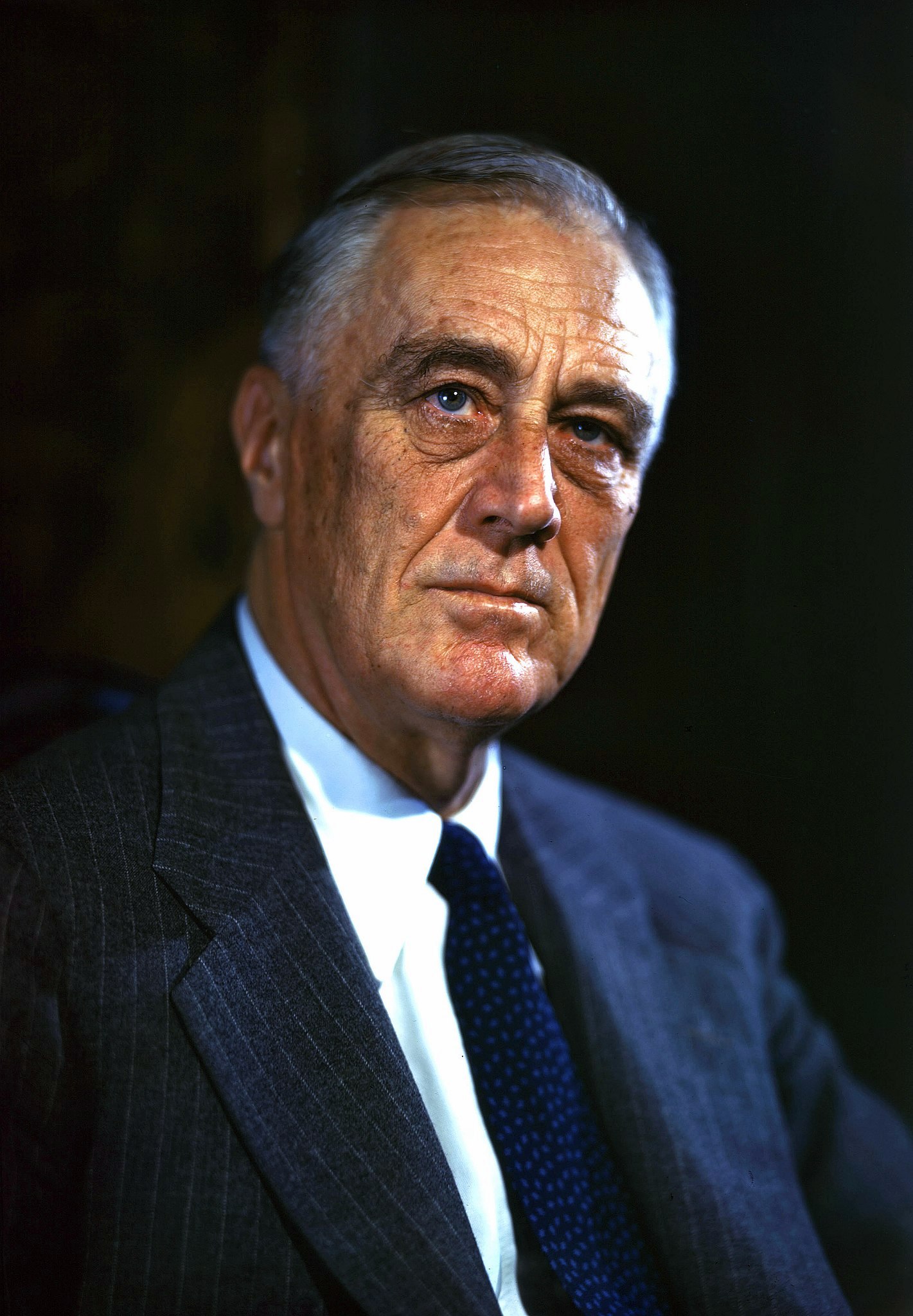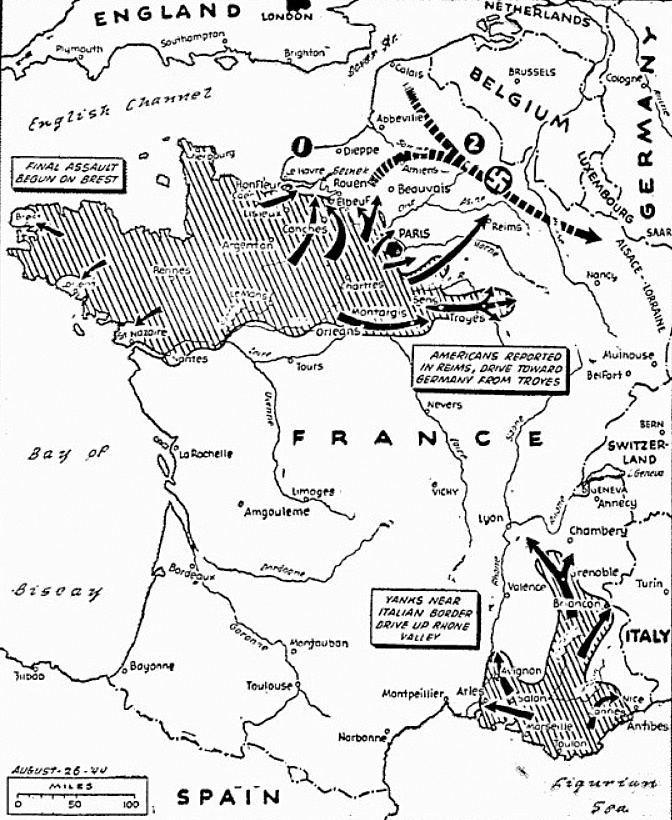Allies mop up virtually all Nazis in Paris
De Gaulle establishes headquarters in city
London, England (UP) –
U.S. soldiers strolled the streets of Paris today and Gen. Charles de Gaulle triumphantly set up headquarters in his liberated capital after surrender of the Nazi commander had ended German resistance except for a few isolated pockets.
As SHAEF announced the cessation of virtually all hostilities in Paris, United Press writer Robert Richards filed a dispatch from the city, dated at 9:10 a.m., reporting that fighting had subsided and that the main concern now was the feeding of the population of five million.
Mr. Richards said that American doughboys were on every street corner and that jeep-towed trailers loaded with food were rolling into the city. Parisians were not starving, Mr. Richards said, but he was told that another month of German occupation would have created an acute food situation.
Commander surrenders
The virtual end of fighting in Paris came only a few hours after the surrender of the Nazi commander, SHAEF announced.
The German commander signed a six-point surrender demand last night and then toured the city with Allied officers, ordering his troops manning strongpoints to lay down their arms, a headquarters spokesman said.
The spokesman acknowledged that some resistance was still being encountered at Davron, 15 miles west of the center of Paris, and possibly in isolated parts of the capital, but the surrender terms provided that any German troops who ignored the “ceasefire” order would no longer come under the “laws of war” and could be summarily shot as guerrillas when captured.
Surrenders to Leclerc
The Nazi commander, whose name was not disclosed, surrender to Brig. Gen. Jacques Leclerc, commander of the French 2nd Armored Division, the first Allied army unit to break into the city.
Gen. Dwight D. Eisenhower’s daily Western Front communiqué said:
More Allied armor and infantry are in Paris following the entrance of the 2nd French Armored Division Friday morning, and all resistance in the southern and southwestern outskirts has been overcome.
Amends announcement
The headquarters spokesman later amended the announcement to include the quelling of virtually all resistance in the city. Thousands of prisoners were believed to have been taken, but the total was not announced.
A Berlin broadcast, for German consumption, said the surrender order was “forced and freely invented” and claimed that Nazi troops were still fighting inside the French capital.
Gen. de Gaulle entered Paris at 7:00 p.m. (1:00 p.m. ET) yesterday while French and American tanks and troops, aided by tens of thousands of Parisians, were still battling Germans and collaborationists in the streets and buildings of the world’s fourth largest city and the first Allied capital to be liberated in this war.
To place wreath
His arrival ended an odyssey that began in June 1940 with his departure – alone of the Reynaud government, in which he was Undersecretary of War – for England, there to rally under the Fighting French banner the forces that eventually were to rise up and help free France.
Today he was to receive the acclamation of Paris, which had listened over forbidden radios to his counsel during the four years and two months of German occupation.
Radio Paris said Gen. de Gaulle would lay a wreath on the Tomb of the Unknown Soldier under the Arc de Triomphe at 3:00 p.m. and drive along the Champs-Élysées to the Place de la Concorde where national anthems of the Allied nations will be played. He will later attend a service of thanksgiving in Notre-Dame Cathedral, the broadcast said.
Whereabouts unknown
Gen. de Gaulle’s entry into Paris wiped out the last claim of the Vichy Government to authority over France. The whereabouts of the Vichy regime was a mystery and its envoys throughout the non-Axis would either had disowned it or had been notified by the countries to which they had been accredited that they were no longer recognized as the representatives of France.
Marshal Henri Philippe Pétain, Chief of State in the Vichy government, was reported by Madrid to have addressed letters to Prime Minister Churchill and Pope Pius XII in which he defended his policy and handed over his disputed authority to Gen. de Gaulle.
The letters were delivered to the Papal Nuncio at Vichy before Pétain was arrested by the Germans and taken to the Reich, Madrid said.
Help Patriots
U.S. and French armored columns finally rolled into Paris yesterday to relieve Patriots who were near exhaustion after battling the Germans since last Saturday under the battle cry of an earlier revolution, “Remember the Bastille!”
Sporadic resistance was met along the way, but it was quickly put down. Men and women swarmed out of their homes and underground hideouts to point out nests of snipers and strongpoints, and soon hundreds of prisoners were filing through the streets they once had tread as conquerors.
One Paris broadcast said some snipers even held out for a while in Notre-Dame Cathedral. Six hundred Germans were captured in the Chamber of Deputies.
Hold Renault plants
James McGlincy, United Press writer and the first American newspaperman to enter the liberated capital, said in a broadcast over the Paris radio that U.S. tanks fired on German forces holding out in the Renault factories.
He said:
It was like Bastille Day in the streets, with crowds eagerly following the battle and taking cover only when shells came their way. Many people held telephone lines open and gave running commentaries to their friends who were not in the battle zone. Then they made appointments for celebrating the victory together.
When Gen. de Gaulle entered the city and his car pulled up outside the War Ministry, tanks which had been his escort closed in on a building only 20 yards away and began firing.
Warns of fight ahead
Gen. de Gaulle went almost immediately to the Prefecture of Police, where cheering crowds greeted him and an orchestra played the “Marseillaise.” Responding, he hailed the liberation of France, but warned:
The enemy is still on our soil. We have to aid the Allies to chase him out. That is one reason why French troops have come with Allied troops in the south of France. All together we shall drive the enemy out of France.
Long live Paris! Long live France! Long live the Republic!
Armistice terms given
Then a few hours later came the news that the German commander in the Paris area had signed an armistice providing that:
-
Commanders will be ordered to cease fire immediately and hoist a white flag. Arms will be collected in an open space while awaiting orders. Arms are to be handed over intact.
-
Military dispositions of mobile units and equipment depots are to be furnished. Depots must be handed over intact with their records.
-
Particulars of destruction of defense works and depots are to be furnished.
-
German staff officers equal in number to the strongpoints or garrisons are to be sent to Gen. Leclerc’s headquarters.
-
Gen. Leclerc’s staff will determine conditions of evacuation of German Army personnel.
-
Once the orders to cease fire have been transmitted, those forces that continue to fight will no longer come under the laws of war, but those who continue to fight unaware of the surrender will be treated humanely.
Other Paris broadcasts said the first consignments of American wheat had already begun to arrive in Paris to relieve a drastic food shortage. Water and gas service was also said to have been restored in the capital.
Jean Le Fèvre, provisional secretary-general for agriculture, set up headquarters in Paris to handle the feeding of the city, the Paris station said, and had broadcast an appeal to farmers of the region to “thresh and deliver grain with the utmost haste.”
Gen. Alphonse Juin, Chief of Staff of National Defense for the French Committee of National Liberation, ordered the population of the Paris region and neighboring areas to stay off roads leading into the city for imperative military reasons.


